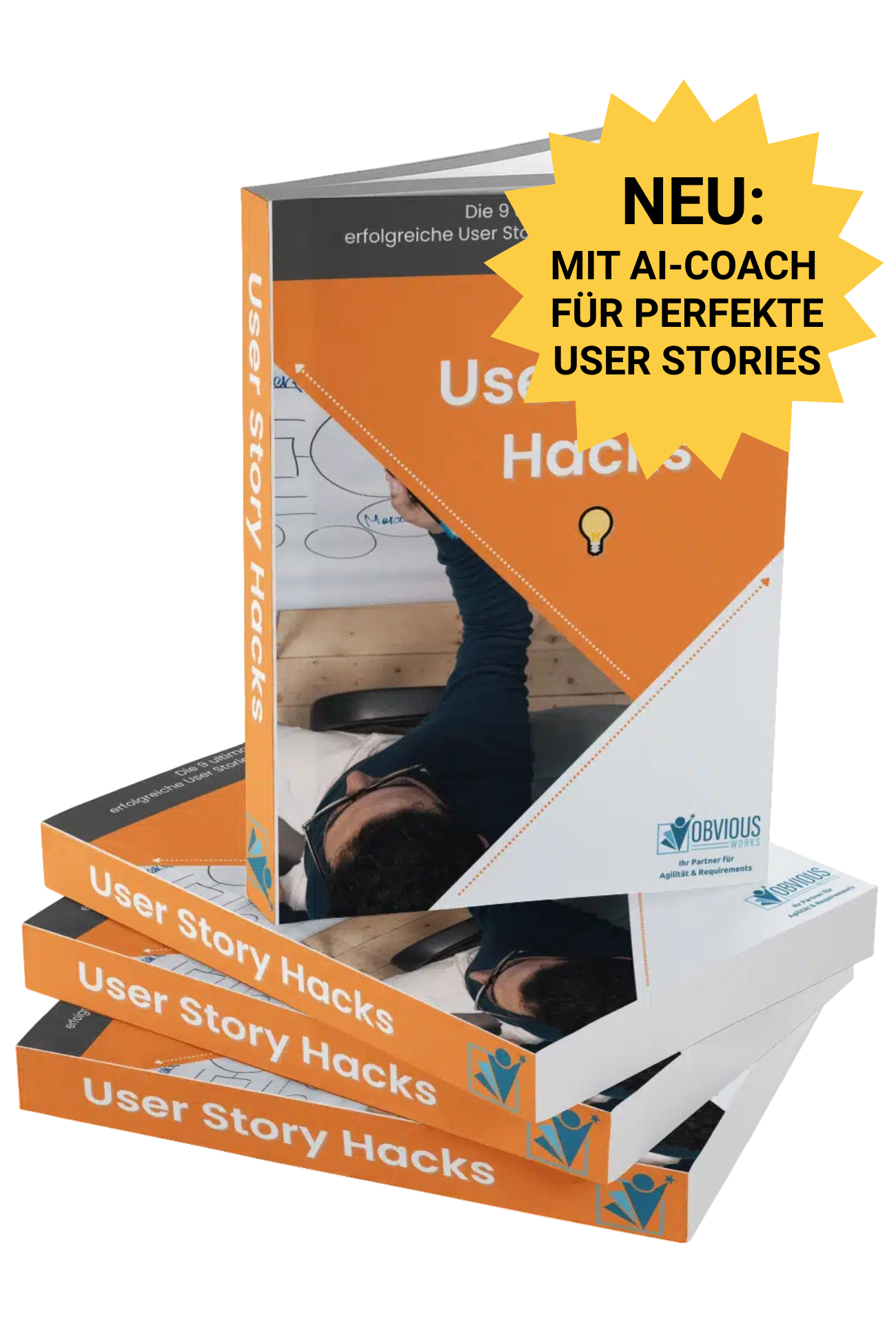IREB Certified Professional - CPRE Foundation (ENGLISH)
Training & certification for requirements engineering 📆 Click here & become a requirements professionalBrief Description
In this course you will internalize the essential elements of Requirements Engineering (RE), gain practical insights and pave your way for the IREB® certification as "IREB Certified Professional for Requirements Engineering (Foundation Level)".
An IREB certification strengthens your credibility as a requirements engineering expert and gives you a competitive edge by recognizing your expertise and skills internationally. It also opens up new career opportunities in this field.
⏱️ 3 days
🏷️ from CHF 2,125 (incl. certification and 15% discount for early bookers)
💳 Payment by credit card, Paypal or by invoice
📑 English course documents in PDF format
🥇 Certificate of course participation
ℹ️ Exam date can be booked flexibly
👥 12 participants maximum
💬 German or English (on request)
⭐ Lunch and catering included. Also for online courses.
⭐ Extra module: Use of artificial intelligence (AI) in requirements engineering
⭐ AI-supported exam preparation in English
⭐ Alumni network: Lifetime membership & access to exclusive AI and RE tools
Our Guarantee
🛡️ Satisfaction
With a smile, you will feel perfectly prepared for the exam.
🛡️ Online Refresher
1x free of charge (participate online again in the 1st year)
🛡️ Extra chance during the test
Second certification attempt in the 1st year is on us!
🛡️ Never go Alone
125 CHF voucher for you and your referral buddy (Info)
You can find all our guarantee services here
At a glance
This IREB CPRE Foundation training provides a comprehensive introduction to the fundamentals of requirements management methods. You will learn how to analyze, capture and manage requirements in order to implement successful software projects. The training is suitable for anyone working in software development who wants to improve their requirements management skills.
Through hands-on exercises and discussions, you will deepen your understanding of the concepts of the IREB CPRE model and learn how to apply it successfully in your daily work. By the end of the course, you will be able to capture, document and manage your requirements more efficiently, resulting in better software projects and more satisfied customers.
Examination
The training concludes with an exam in which you can demonstrate the knowledge you have acquired. Successful graduates receive the certificate as "IREB Certified Professional for Requirements Engineering (Foundation Level)"which demonstrates their competence in requirements management.
An IREB certification strengthens your credibility as a requirements engineering expert and gives you a competitive edge by recognizing your expertise and skills internationally. It also opens up new career opportunities in this field.
Unique Advantages
⭐ Lunch & catering included
For online courses with Uber Eats - voucher
⭐ AI use cases in RE
Use cases of artificial intelligence in requirements engineering
⭐ AI-supported exam preparation
Our RE KI Bot helps you to get perfectly prepared
⭐ Alumni network - Lifetime Access
Membership & access to exclusive AI and RE tools
⭐ Full flexibility
You can find our cancellation conditions here
IREB CPRE Foundation Level
Content of the training
Our comprehensive IREB CPRE Foundation training course is specifically designed to provide software development professionals with in-depth knowledge of requirements engineering (RE). In this course, you will not only gain a solid foundation in RE, but also learn effective techniques for eliciting, specifying and managing requirements in order to operate successfully in software projects.
The central aspects of the RE process, such as the systematic capture, modeling and documentation of requirements, are covered in detail. This training is ideal for all those who want to expand their skills in requirements management and prepare for the IREB CPRE certification exam.
The following topics are covered in this training course:
- Introduction & Overview Requirements Engineering
- Basic principles of requirements engineering
- Process and work structure
- Practices for the elicitation of requirements
- Work products and documentation practices
- Practices for the validation of requirements
- Methods for requirements management
- Tool support
- Exam preparation
We are closely oriented to the official curriculum "IREB Certified Professional for Requirements Engineering (Foundation Level)" in the current version.
In practice-oriented exercises and discussions, you will deepen your understanding of the concepts and learn how to apply them successfully in your daily work. By the end of the course, you will be able to capture, document and manage your requirements more efficiently, leading to better software projects and more satisfied customers.
Benefits of the training
- Learning basic methods and principles of requirements engineering
- Improved understanding of the different needs of stakeholders
- Sharpened ability to elicit, document and validate requirements
- Improved collaboration and communication within the project team
- Increased customer and project team satisfaction
- Increasing efficiency in requirements engineering
- Increased project success rate through better practice in requirements management
- Targeted preparation for the "IREB Certified Professional for Requirements Engineering (Foundation Level)" certification
Format
Agenda
1st day: 09:00 - 17:00
2nd day: 09:00 - 17:00
3rd day: 09:00 - 17:00 (incl. exam preparation)
Approach and didactics
Our training is primarily designed to be interactive. Short theoretical blocks are followed by a variety of practice-oriented exercises, which are completed both individually and in small groups. The results are then reflected on collectively.
We focus on lively, inspiring learning and deliberately avoid a tiring "slide battle".
Our focus is on the mutual exchange of knowledge between participants and the long-term, practical benefits of the newly acquired knowledge. The positive feedback from our course participants speaks for itself.
In addition to collaboration boards, modeling tools, slides and exercises, we use gamification elements for the recap of the previous day.
Prerequisites
There are no formal entry requirements for this course.
To get the maximum benefit from the training, you will be provided with the IREB® manual in advance.
Based on previous experience, studying the material beforehand helps to establish a common basic knowledge among the participants. This leads to a more dynamic and interactive course.
You should plan at least 4 hours for this preparation.
Target group
Our IREB CPRE Foundation training is ideal for a wide range of professionals in the software and IT industry who wish to develop their expertise in requirements engineering. This comprehensive training is aimed in particular at:
- Requirements Engineers: Improve skills in requirements elicitation and specification.
- Business Analysts: Deepen your understanding of the interfaces between business processes and IT requirements.
- System analyst and test manager: Expansion of knowledge in dealing with complex system requirements.
- Software developers and project managers: Strengthening skills in requirements management and project planning.
- Quality manager and IT consultant: Expanding the understanding of the importance of requirements in quality assurance.
The course is also ideal for:
- Product Engineers, Product Owners and Product Managers: Acquire skills to effectively design and manage product requirements.
- Project staff: Acquisition of knowledge for the precise formulation, clarification and interpretation of requirements.
This makes the course an indispensable tool for anyone working in related areas such as IT project management, quality management or software testing who would like to deepen their knowledge of requirements engineering.
Certification
As a participant in this course, the door will open for you to make your expertise internationally visible with the renowned IREB® certificate - a valuable boost for your CV.
You can take the exam individually after the course and flexibly online via our certification partner Certible.
The fee is included in the course.
Exam format
- Closed book, i.e. no aids are permitted
- Multiple choice
- Language: German or English
- Duration: 75 minutes
- Number of questions: 45
- Points per question: 1-3 depending on difficulty
- Minimum score: 70% to pass the exam
- Platform: Online in the browser
In-house training
An in-house training course makes sense for 6 or more participants. We are also happy to come to your company and bring our IREB CPRE Foundation training with us. Simply make a get in touch with us.
In-house training as live remote training
Are your employees spread across several company locations and working from home? We offer you the opportunity to conduct a fully-fledged in-house training course online. Our experienced trainers teach the same material as in a face-to-face training course and are of course available to answer participants' questions.
Interactive exercises in small groups are carried out in the same quality via breakout rooms and Miro as a collaboration platform. You also save on travel costs for the trainer.
We cater to individual wishes
Would you like to train your employees, but without focusing on the certification exam? Or do you have other special focuses or interests? We are happy to cater to your individual requirements.
Subsequent workshop with your team
Would you like to apply what you have learned with your employees in your own context after the training and need a workshop as a booster? We would be happy to conduct a workshop at your company and address your individual priorities. Contact us us without obligation.
Your trainers
| Matthias Herbert | Michael Mey | |
| to the trainer portrait | to the trainer portrait |
Our location at ImpactHub Zurich (5 min from Zurich-HB)
You don't wanna go alone?
We understand, bring your mate!
🎁 1x Voucher for you
🎁 1x Voucher for your buddies
125 CHF voucher each for Amazon / Digitec or Galaxus
References
FAQ - Questions & Answers about IREB training
Who is behind this requirements engineering training?
The International Requirements Engineering Board (IREB) develops and maintains the training, including curricula and the associated examinations. This IREB CPRE Foundation course is the introduction to the IREB training framework. Find out more at IREB.
What are the requirements for participating in the training?
There are no formal requirements for participation in this training. Basic knowledge of IT and software engineering is recommended but not essential.
Is the certification exam included in the course price?
Yes, the examination fee is included in the total price of the training course.
If you need a second attempt, this will be on us in the 1st year after the training.
Does the training offer practical exercises?
Yes, the course includes both theoretical content and lots of practical exercises.
What is the ratio of theory to practice in the course?
The course offers a balanced mix of theoretical knowledge and practical applications.
Will I receive a certificate on completion?
Yes, after successfully completing the exam you will receive an official certificate.
After completing the course, you will receive a certificate of participation from Obvious Works.
What is the pass rate for the certification exam?
Our participants have an above-average success rate, and we are happy to provide more precise figures on request.
Are the training materials included in the price?
Yes, all required training materials are included in the price in digital form.
Is the training led by experienced trainers?
Yes, our Trainer are experienced specialists with extensive practical experience.
Are there discounts for group bookings?
Yes, we offer special conditions for group bookings. Simply make a get in touch with us.
Is the course also suitable for beginners?
Absolutely, the course is designed in such a way that it is understandable even for beginners in the field of requirements engineering.
How up-to-date is the training material?
Our training material is regularly updated to cover the latest developments in the field.
Can I receive further support after the training?
Yes, we offer aftercare and support for our participants. Simply send us a get in touch with us.
Is there a money-back guarantee if the course does not meet my expectations?
Yes, we offer you a satisfaction guarantee with the possibility of a refund under certain conditions.
Are there any other guarantees from your side?
Yes, in addition to our satisfaction guarantee, we offer you a free online refresher within one year of your training. This means you can take part or all of the course online a second time if you wish.
How do training and certification work?
The IREB defines the curricula, examinations and examination criteria. Training companies such as Obvious Works can be accredited by IREB if their training materials follow the official curricula and training standards.
The certifications are carried out by separate, licensed certification bodies in the individual countries.
Which certification body administers the exam for IREB training participants of Obvious Works?
We have been working successfully for years with Certiblea renowned certification body for online examinations. It conducts the examination and awards the certificates.
What training modules are available in IREB?
There is the "IREB Certified Professional for Requirements Engineering (Foundation Level)"which is the introduction to requirements engineering training.
There is also the "Agile Primer"which teaches you how to use the basics, especially in an agile environment.
The Advanced Level consists of four independent modules "Elitivation & Consolidation", "Requirements Modeling", "Requirements Management" and "RE@Agile".
Regarding the Expert Level, IREB writes: "Expertise means knowledge and experience at the highest level, which is acquired in a long and individual process. Consequently, there is no Expert Level syllabus or training. You can find more information directly at IREB.
What criteria are used to evaluate the IREB examinations?
Please look directly at the official examination regulations. With all our certification courses, we prepare you intensively for the exam as part of our training.
Do I need to have attended a training course in order to take the "IREB Certified Professional for Requirements Engineering (Foundation Level)" exam?
No, attending our IREB CPRE Foundation course is not a prerequisite for taking the exam.
However, training is recommended as it conveys the content in a more in-depth form and at the same time ensures practical application within exercises.
In which language can I take the IREB certification exam?
You can currently take the IREB CPRE Foundation exam in German, English, Chinese, Dutch, French, Italian, Polish, Portuguese, Russian, Spanish and Swedish.
However, we recommend that you take the exam in the same language in which you attended the training and read the IREB handbook.
If you are not taking the exam in your native language, you can apply to extend the exam time from 75 to 90 minutes.
What are the advantages of certification as an "IREB Certified Professional for Requirements Engineering (Foundation Level)"?
The IREB CPRE training provides the necessary knowledge for the systematic analysis and preparation of requirements in a practical way.
A properly conducted requirements analysis is the basis for successful software development projects. Without correct requirements, the risk of expensive planning errors increases enormously. Solid methodological knowledge helps to minimize such risks.
By successfully passing the exam and obtaining your certificate, you can prove your competence in requirements management and enhance your CV.
Does this training also take into account how to deal with different project participants and stakeholders?
Yes, in addition to the actual requirements, we also go into detail about stakeholder management.
Is IREB certification based on a specific standard?
No, the training modules are developed and maintained by the International Requirements Engineering Board (IREB). However, the large number of certified individuals shows that IREB has now become a de facto standard for requirements engineering.
You can find detailed statistics directly on the IREB Website.
How long is an IREB certification valid for?
The IREB CPRE certification is valid for an unlimited period of time.
How recognized is the IREB certification?
By the end of 2023, more than 90,000 people worldwide will have been certified. This shows that more and more IT professionals see requirements engineering as a core competence. At the same time, the certification of individuals has become an important competitive standard.
You can find detailed statistics directly on the IREB Website.
Is there a recommended magazine on the subject of requirements engineering?
Here you will find an online magazine in English on the subject of requirements engineering. The magazine is published four times a year and reports in detail on current topics from this specialist area.
FAQ - Questions & Answers on IREB training content
What is requirements engineering and why is it important for the development of systems?
Requirements engineering (RE) is the systematic and disciplined method of eliciting, documenting, reviewing and managing the requirements for a system. It is critical to the success of system development projects as it helps to understand the needs and wishes of stakeholders and ensure that the final system meets them.
What are the main tasks involved in requirements engineering?
The main tasks in RE include identifying the requirements, documenting them, validating them to ensure that they meet the actual needs, and managing the requirements throughout the lifecycle of the system. Tool support can also be used for these tasks to improve efficiency and accuracy.
What three types of requirements are distinguished in requirements engineering?
In requirements engineering, we distinguish between functional requirements, quality requirements and constraints, each of which affects different aspects of a system.
Why is it important to distinguish between different types of requirements?
A clear distinction between functional, quality requirements and constraints is important in order to define the solution space appropriately and avoid misunderstandings that could lead to undesirable developments.
Why is requirements engineering particularly relevant for software-centered systems?
Software-centric systems that combine hardware, software and organizational aspects are particularly complex. Requirements engineering helps to systematically capture and manage the diverse requirements of these systems.
Is it possible to successfully implement requirements engineering without formal processes?
While there is no universal process for requirements engineering, a suitable RE process tailored to the situation must be defined for each development.
What significance do stakeholders have in requirements engineering?
Stakeholders influence or are influenced by the system to be developed and are therefore central to determining the system requirements.
What does the role of a requirements engineer involve?
A requirements engineer is responsible for the determination, documentation, validation and management of requirements and acts as a bridge between the problems and the possible solutions, or as a bridge between specialist departments/business and technology/IT.
Why is a common understanding important in requirements engineering?
A common understanding is crucial to ensure that everyone involved interprets the requirements and objectives of the project in the same way and to prevent undesirable developments.
How can the value of requirements engineering be assessed?
The value of RE is determined by the benefits of the requirements in relation to the costs of their elicitation, validation and management. A key objective of RE is to minimize the risk of rework and failure.
What are the effects of inadequate requirements engineering?
Poor RE can lead to unclear, missing or incorrect requirements, which in turn can cause expensive rework, communication problems between stakeholders and ultimately project failure.
How does the Kano model help to incorporate the customer perspective into the development process?
The Kano model helps to understand the customer perspective by categorizing features into delight factors, performance factors and basic factors, leading to a user-centric design.
What is the advantage of using the Kano model in requirements engineering?
The Kano model helps to identify not only obvious requirements, but also those that contribute to customer enthusiasm and stand out from the competition.
What are basic factors in the Kano model?
Basic factors are features that customers tacitly assume and take for granted. If these features are not implemented in the system, this leads to considerable dissatisfaction.
What are performance factors and how do they affect customer satisfaction?
Performance factors are features that are explicitly requested by customers. Their number and quality in the system correlates directly with customer satisfaction. However, an excessive number can increase costs, which is why a cost-benefit analysis is important.
What are enthusiasm factors in the Kano model of requirements engineering?
Delight factors are features that customers do not explicitly request because they do not know that they are possible in the system. Such features can positively surprise customers and clearly set a product apart from the competition.
How do prioritization techniques influence requirements engineering?
Prioritization techniques help to identify the most important requirements and ensure that resources are used efficiently to implement the most valuable features.
What does traceability mean in the context of requirements engineering?
Traceability refers to the ability to track the lifecycle of a requirement, from identification to implementation to maintenance, and is critical to the effective management of change.
To what extent are graphical models and diagrams important in requirements engineering?
Graphical models and diagrams are key tools in requirements engineering, as they visualize complex requirements and system structures and improve understanding and communication between stakeholders.
Which graphical models and diagrams are included in the IREB curriculum for the representation of structure and data?
The IREB curriculum includes UML class diagrams for representing classes and their associations as well as entity-relationship diagrams (ERD) for modeling objects, attributes and relationships.
Which models does IREB recommend for the representation of function and process?
For function and process, the IREB recommends models such as UML use case diagrams, UML activity diagrams and data flow diagrams.
Is requirements engineering also relevant in an agile context?
Yes, requirements engineering is also relevant in an agile context. Iterative RE processes are adaptable and can take changes or forgotten requirements into account in later iterations, which makes them particularly suitable for agile development processes.
Can IREB knowledge be applied in both agile and waterfall development processes?
Yes, IREB knowledge can be applied in both contexts. A strict separation of RE from system development is rarely possible, so flexibility in the application of knowledge is important.
Which requirements elicitation techniques are preferred in waterfall projects compared to the agile approach?
In a waterfall project, more extensive techniques such as apprenticing or analogies are planned, whereas in an agile environment, techniques such as brainstorming, storyboarding and prototyping predominate.
How do requirements management techniques differ between agile and waterfall processes?
The agile approach, such as Scrum, reacts more flexibly to changes, requirements are updated more frequently and are more closely intertwined with development, whereas waterfall processes are more plan-based and sequential.
What is the advantage of UML class diagrams in requirements engineering?
UML class diagrams help to visualize class structures and their relationships to each other, which is important for the analysis and understanding of complex data structures in a system.
How does BPMN help in requirements engineering?
BPMN supports the precise representation and understanding of business processes, which is essential for the correct recording of functional requirements and processes in a system.
How does the decision for an agile or waterfall model influence the choice of RE techniques?
The decision to use an agile or waterfall model influences the choice of RE techniques, as agile models require an iterative and adaptable approach, while waterfall models favor a sequential and plan-based approach.
What is meant by the backward traceability of requirements in requirements engineering?
Pre-traceability refers to the ability to trace the origin of a particular requirement. This means that it is possible to trace where and how a requirement was determined and which sources were taken into account. This is particularly important for safety-critical systems, where process standards often require explicit traceability.
How is forward traceability ensured in requirements engineering projects?
Post-traceability means being able to identify where and how a requirement is used within the system, e.g. in which modules, test cases or documentation it is implemented. This is also known as post-requirements specification traceability and is crucial for the management of requirements implementation.
Which quality criteria apply to individual requirements in requirements engineering?
Individual requirements must be clearly defined, unambiguous, complete and modifiable. They should not overlap with other requirements and should be structured in such a way that they can be modified without any loss of quality. It is also important that they are traceable, i.e. that their origin and use in the system can be clearly traced.






